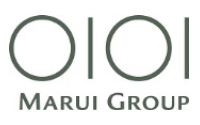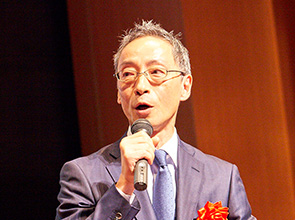Conference on Competitiveness
Interviews with the Prize Winners
Marui Group Co., Ltd., the Card Business
Interviewer: Professor Ken Kusunoki, Hitotsubashi University Graduate School of International Corporate Strategy (Hitotsubashi ICS)
Inerviewee: Mr. Hiroshi Aoi, President and Representative Director, Marui Group Co., Ltd.
Inerviewee: Mr. Hiroshi Aoi, President and Representative Director, Marui Group Co., Ltd.

Main Points
- Merged the retailing and credit card operations
- Targets young customers
- Does not use Gold Cards to attract wealthy customers
- Practices credit risk management based on card usage history
- Develops employees' knowledge of both retailing and credit card operations
- Kusunoki:
- Marui Group offers credit card services under the EPOS Card brand name. "Strategy" means providing value that is different from one's rivals, but the credit card business is already a mature business in Japan, and the user population is declining. So it is not easy to achieve differentiation from other companies. The EPOS Card has adopted a unique strategy. First, this card's target customers are different from those of other companies. Which customer segment do you target?
- Aoi:
- Professor Kusunoki, will you please ask our audience if they have EPOS Cards?
- Kusunoki:
- All right, let me ask them. People who have EPOS Cards, please raise your hand. One glance is enough to tell that most of the people who have raised their hands are young.
- Aoi:
- Thank you. As we saw just now, we target young customers. About 60 percent of our customers are aged 39 or under. This is exactly the opposite of our rival companies. This is the biggest difference.
- Kusunoki:
- It's frequently the first credit card people own. Another difference is that earnings come from shopping and revolving credit payments, not annual membership fees. I wonder why you have a unique system. Is it because originally the company was a retailing company, now one that also offers an integrated credit card service? Please tell us more on this point.

Mr. Hiroshi Aoi, President and Representative Director, Marui Group Co., Ltd.
|
- Aoi:
- Marui was founded in 1931. In the beginning, we used to sell furniture and allow payment in monthly installments. So, our business involved selling products and providing credit for them. The Marui group has adapted its integrated retailing and credit business to accommodate changes in society and customer needs.
- Kusunoki:
- From the viewpoint of integration, customers tend to apply for new credit cards at stores more than any other place, isn't that right?
- Aoi:
- Yes, 70 percent of our new members come from tenant shops inside Marui Department Stores. We also collaborate with commercial facilities, which issue our cards at a dedicated booth or counter in stores other than Marui Department Stores.
- Kusunoki:
- I have heard that the EPOS Card is issued to customers immediately, right then and there, at the time of application.
- Aoi:
- We are extremely particular about making sure that customers can receive a credit card on the same day, and at the same place where their card application has been submitted. We had to solve many technological problems to accelerate this process. We can now issue a credit card in about 20 minutes, which makes it easy for people to become members.
- Kusunoki:
- I hear that arrangements for bank transfer procedures can be completed even if the customers don't have an inkan (a personal seal). [A registered seal is commonly used in Japan in place of a signature in personal documents.] Is that possible?
- Aoi:
- We carry out the formalities by accessing the necessary information from cash cards.
- Kusunoki:
- So people can get the EPOS Card made while they are doing their shopping.
- Aoi:
- If you consider how many new members we make per 100,000 yen in retail sales, you will find that our new membership rate is 3-4 times higher than that of other retailing companies.
- Kusunoki:
- As far as the features are concerned, most cards offer similar services. But how customers use the card depends on what procedures they must follow to join and how they view the card. This business is based on a deep understanding of human psychology, isn't it?
- Aoi:
- From our earliest retailing days, when we began accepting payment in monthly installments, we never targeted wealthy customers. We target people with ordinary incomes, and young people who might not earn much now but will have higher levels of income in the future.
These days, we hear a lot about "financial inclusion." Marui has been implementing this concept for 85 years, by targeting young people and people with ordinary incomes.
- Kusunoki:
- In the process of providing credit, other companies make their decision about whether to extend credit based on the customer's creditworthiness, which depends largely on the individual's economic status. In contrast, Marui manages its credit system on the basis of card usage.
- Aoi:
- I think this way of thinking is quite unique. We call this approach to credit our "credit philosophy." Our founder used to say that "credit is not something we provide to the customers, it something we build together with them." In line with this thinking, we advocate what we call "co-creation management." [According to Marui Group, co-creation management entails "incorporating the customer's perspective into all business processes, and thereby working to co-create customer happiness with our partners."] In the case of the EPOS Card, all customers start out with a low credit limit irrespective of their income levels. After taking into account the cardholder's transaction history, the credit limit may be raised gradually. This is how we are building creditability together with our customers. Also, our loss rates are among the lowest in the industry.
- Kusunoki:
- I gather that the meaning of your Gold Card is also different from that of other companies.
- Aoi:
- The EPOS Gold Card stands out among all Gold Cards worldwide. In general, Gold Cards are meant for wealthy customers, who must pay a high annual membership fee for premium services. With the EPOS Card, however, our way of thinking is that "Gold Cards are for regular customers who are frequent users of our service." We don't charge a membership fee for the Gold Card when customers upgrade their card at the company's invitation.
- Kusunoki:
- I've heard that 20 percent of your card users have Gold Cards, and Gold Card holders account for 60 percent of the EPOS Card's transaction volume. This seems to suggest that Gold Card members use the EPOS Card as their main card for shopping.
- Aoi:
- Our initial concept was "Start & Forever," which means that we want customers to use our card as their first one, and then continue using it for the rest of their lives. One way to encourage customers to use the card for a long time is to turn them into Gold Card members.
Initially, the number of female customers who switched to the Gold Card was only half the number of male customers. Our customers told us that even if we write on our invitation card that membership is free, and that this will never change, they don't believe that this is true. So, our retail staff members have begun speaking directly to customers as they check out at the sales counter, explaining the specifics of our credit card. As a result, the number of female customers who have switched to the Gold Card has grown sharply.
- Kusunoki:
- This, too, is possible because of the integration of credit card operations with retailing operations. Such face-to-face interaction is effective indeed.
I think Marui provides a clear example of how strategy can be used to create differentiation even in a mature industry like the credit card industry.
Winners PDF
- 第17回 ポーター賞受賞企業・事業 PDF (All of the award company in this year are published. )






